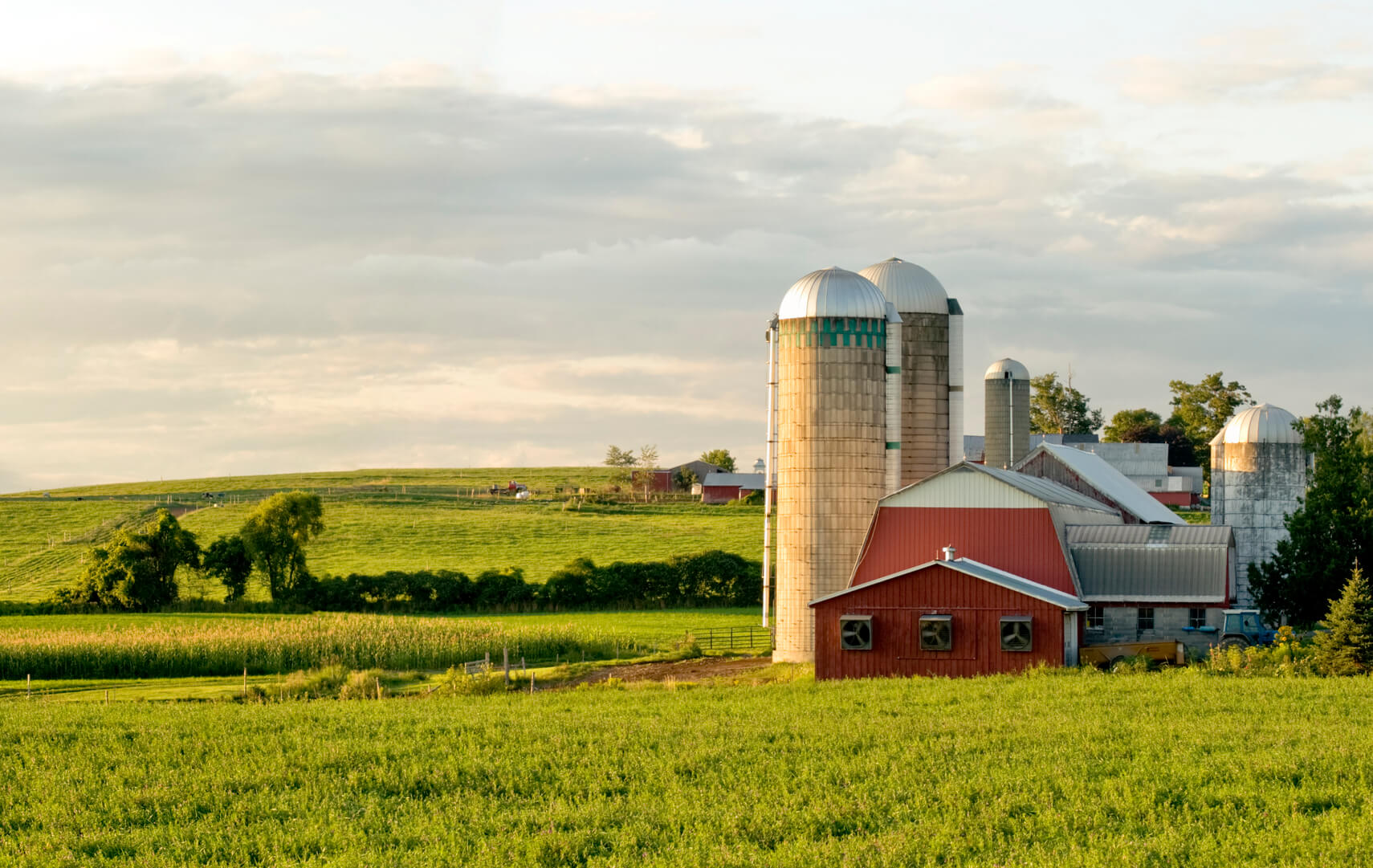
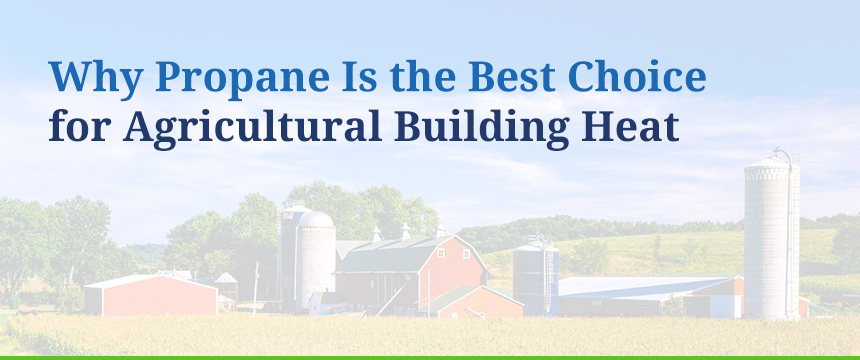
Propane gas has spread in recent years as more organizations seek alternatives to conventional types of fuel. One industry that has benefited from the trend is the agricultural sector, where farmers can boost efficiency, lower costs and reduce emissions by switching to propane gas. Propane is especially powerful as a heating option for farm buildings.
Propane heat can transform the way that you operate a farm and its various buildings. There are several ways to distribute heat from a propane tank. Depending on the layout of your farming operation, you might prefer a boiler or a furnace. With propane, heating becomes more efficient in barns, greenhouses and other types of farming enclosures. Propane can also be used for other types of heat devices and fueling needs.
Propane building heat can be distributed through a boiler system, where hot water is used in lieu of direct heat. While a furnace distributes warm air via heating ducts, a boiler sends heat into small pipes that pump hot water to cast iron radiators. Boilers are convenient for the heating of farm buildings like greenhouses and dairy barns where air ducts might be impractical.
With heating boilers, you could have the system attached to an outside propane tank where heat would be generated for distribution into each of your farming enclosures. The tank could also be used to fuel rolling stock and your irrigation system.
Another way to heat a farm building is with a radiant heating system, where heat is supplied through wall, floor and ceiling panels. A radiant heat system can draw its fuel from an external propane tank. In an enclosure such as a livestock farm or greenhouse, panels are a much more structurally convenient means for heat distribution than air vents.
If you have a radiant heat system installed into your farm buildings, the setup could vary depending on the design of the enclosure. The heat could be sent straight to the floor, if convenient, or to panels on the walls. Alternately the heat could be sent to the ceiling of the enclosure. The warmth will spread through radiant heat transfer.
Heating furnaces can be especially designed to suit the unique needs of a building. If you are willing to make the initial investment, you could have a furnace designed to match the requirements of your farming property. While there are various options when it comes to furnace designs, you might wish to have a built that will fit into a certain space or have select attachments that accommodate the layout of the farming building in question.
In the agricultural industry, workshop heat is best supplied with propane gas. While other fueling options could leak or spread noxious gases, propane is a low-emitting substance that is environmentally friendly. Since propane is a gas, not a fluid, there is no risk of leaks in the event of a propane tank accident. For agricultural building heat, propane in the safest and healthiest option for workers, livestock and crops.
By using propane for agricultural building heat, you can help reduce emissions and become a more green-friendly farm in the process. In doing so, your farm could gain a better reputation within the food industry as well as with the public at large. Propane can be used to fuel everything from the heating system in your workshop to the tools you use in food processing.
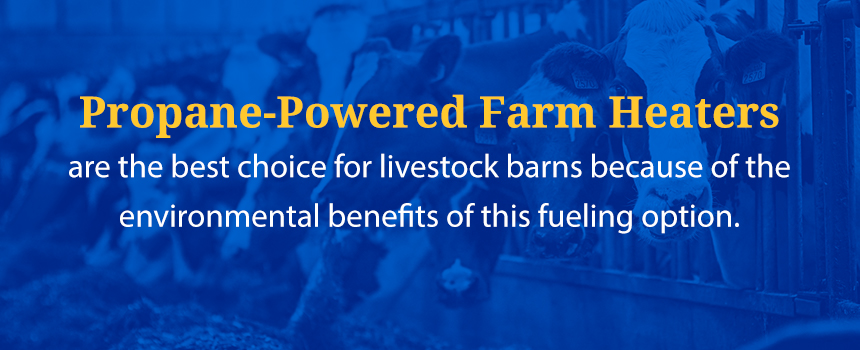
Propane-powered farm heaters are the best choice for livestock barns because of the environmental benefits of this fueling option. With a propane livestock barn heater, you can keep the area sufficiently warm for all the animals. At the same time, you won’t have to worry about noxious greenhouse gases affecting the health of the livestock or their feed.
In a propane-heated environment, animals remain healthy during their time on a farm. This ensures healthy meats and animal byproducts for consumers. Effectively, propane helps to ensure the health and sanitation of livestock and animal products through the various steps along the farming, processing and packaging chain.
Propane farm heating systems are also the best option for poultry houses, where the air should be as clean and pure as possible to ensure the optimal health of the birds. With a propane poultry house heater, the chickens and turkeys can be kept at proper temperatures in a clean-air environment. At the end of the cycle, healthy meats and eggs can be packaged and shipped to the nation’s supermarkets for public consumption.
Propane heat can be used in a poultry house for the various heating and energy functions required. The gas can power tools, machines and appliances and also provide heat during the colder months of the year.
Propane is also the best option for greenhouses, where the eco-friendly gas can be used to keep plants, fruits and vegetables at proper temperatures. With a propane greenhouse heater, you can rest assured that the crops within the greenhouse enclosure will be maintained at healthy temperatures until they are edible, or a decorative plant is ready to be packaged and shipped to the nation’s supermarkets.
When fruits and vegetables are cultivated, it is crucial for the surrounding environment to be pure and free of toxins and noxious gases. With propane, emissions remain at an absolute minimum. Propane can be used to generate warmth within the greenhouse enclosure and also to power the machines and irrigation system.
One of the greatest technological developments in recent farming was the advent of propane flame weeders, which allow you to kill off weeds without the use of chemicals. Flame weeding is a thoroughly organic process whereby weeds are removed by a propane-based heat dispenser. The heat can be dispensed through a manual blower or a tractor-like device.
Once the soil is tilled in advanced of an upcoming crop season, you can drive a propane flame weeder across the soil to eliminate weed growth before it even begins. Flame weeders employ focused heat bursts that eliminate weeds with no expensive pesticides or labor-intensive manual removal.
Propane can also be used to heat farmhouses. If you have a house on the acreage that is situated in relative proximity to the propane tank that heats your farming enclosures, you could also use that tank to supply heat into your house. This way, the whole entire farm could run on propane gas, allowing you to live an environmentally sound life both on and off the job.
Due to the large size and high heating costs associated with farming enclosures, propane can provide huge savings in those areas. However, propane heat can also help you save on your home heating costs.
Propane gas is also an ideal source of fuel for modern irrigation systems. As one of the more costly aspects of a farming operation, irrigation should be accomplished with the most efficient methods possible. Due to the lower cost and higher fueling power of propane, you can get more energy for less when you switch to this option for your irrigation system.
For operations that occur out in the field, it is also important to use the most environmentally sound options. Propane fuel produces fewer greenhouse gases and is, therefore, the healthiest choice for the soil, grass, plants and crops.
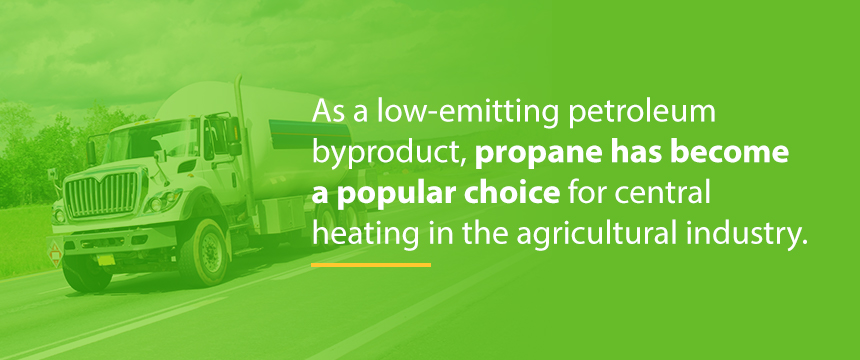
As a low-emitting petroleum byproduct, propane has become a popular choice for central heating in the agricultural industry. The benefits of propane for farm building heat extend to the following areas:
With propane, you can save money on your farm heating costs. Propane gas is abundant and widely available at a relatively low cost. Thanks to its efficiency and high power, a little bit of propane can go a long way. When you use propane, you can power your heating system at a fraction of the cost that it would take with more conventional forms of fuel.
The savings that you gain by using propane can be passed onto other areas of your farming operation. Over a given year, the savings could allow you to invest in newer farming equipment and upgrade your dairy, livestock and greenhouse enclosures. Moreover, you can take the savings from your farming operations and pass some of those savings onto consumers.
Propane is a safer option for farm heating because it is a gas and not a fluid. While gasoline can spill and lead to farming disasters, propane is easily contained and relatively safe when properly stored in a tank. Propane is also a low-emitting gas and is therefore unlikely to spread toxins through the farming environment. As such, propane is a healthier option for plants, crops and livestock. By extension, propane is a healthier choice for the public at large because the standards you employ at a farm will ultimately be felt by the general consumer.
When it comes to the environment, propane farm building heat is one of the better options for the agriculture industry. As a low-emitting gas, propane poses no health risks to livestock and vegetation. Propane can be used to power irrigation systems and equipment and also be used to heat the enclosures where plants and crops are grown indoors. With propane, these products can be grown in a clean environment with no toxins.
As with all branches of the agriculture industry, farms play a critical role in the environment. The fuel that you use to heat and power your operations is the most decisive component of your mark on the environment. When you use propane for your heating and energy needs, your farming operation can be at the forefront of the more eco-friendly farms in the industry.
Propane building heat is a bargain for any large operation, including farming, but it does require some preparation and wise decision-making to make the switch. If you are switching from natural gas to propane, you will need to prepare the preexisting connecting parts on your farm and hire professionals for the transportation and setup.
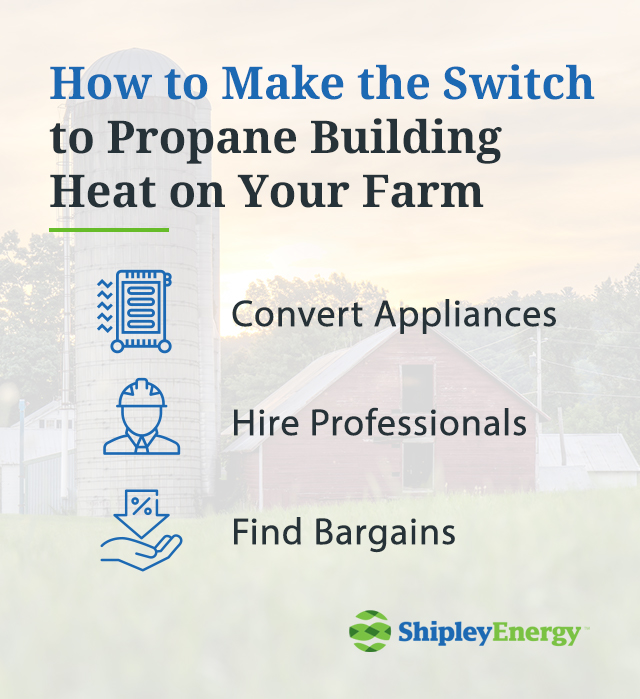
Before you switch from natural gas or electricity for the heating system on your farm, you will need to check the fittings on the applicable components within your heating system. Even though most appliances are built to draw power from natural gas as well as propane, changing from one to the other does require fitting adjustments for propane connections. With some appliances, these fittings are included with the original purchase. If one of these fittings is missing, get in touch with the manufacturer.
The process of setting up propane tanks and connecting your system components should be handled by a professional. While you might be able to do some of the work yourself, it is generally not advised due to the security risks of carrying and transporting propane tanks. To get the tank to your farming location, it will need to be properly secured in a large truck and tightly set in its designated spot on your property. Propane technicians can handle this task and also make an evaluation of your farming operation to assess your conversion needs.
One of the great advantages of propane is that it can help you lower the cost of your farming operations. Propane is also less expensive during certain times of the year, particularly during the warmer months when demand is low. If you purchase a propane tank or a refill of fuel during the summer, you can often find great savings on the price of each.
The summer season is also the best time of the year to hire techs to come and install a new tank on your farming property. Most propane companies are booked during the winter months when everyone needs heating fuel, but scheduling is not so tight in the summer when suppliers are more eager for business. Therefore, you will usually find the best deals in July and August.
The Propane Education & Research Council (PERC) has sponsored the 2019 Propane Farm Incentive Program. The program incentivizes farmers to switch to propane for their farm heating costs. Participating farms can get discounts of up to $5,000 on propane systems and machinery. The money can be used to purchase propane tanks, boilers, irrigation engines and other types of propane farming equipment.
In Maryland and Pennsylvania, Shipley Energy is the trusted name in propane delivery. We deliver propane to farms day and night, even on weekends and holidays. Contact us online to learn more about farmers’ propane or to schedule a propane delivery. You can also call us at (855) 743-0557.
